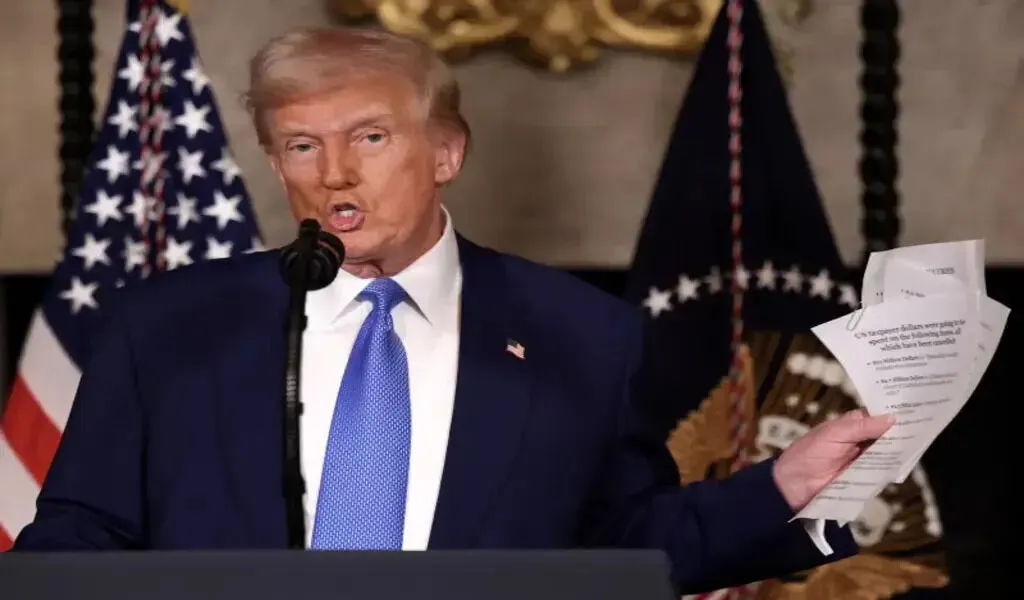(VOR News) – On Tuesday, President Donald Trump issued an executive order strengthening his authority over independent regulatory organisations established by Congress to operate independently of the White House.
The Securities and Exchange Commission supervises markets, the Federal Deposit Insurance Corporation safeguards bank funds, and the Consumer Product Safety Commission conducts recalls and warns customers about potential safety hazards.
Donald Trump’s order omits the Federal Reserve’s Open Market Committee.
The Federal Reserve’s capacity to preserve economic stability is regarded to be based on its deliberate independence from the influence of election politics, as it is in charge of monetary policy development.
The mandate demands that relevant agencies establish White House liaison offices, “consistently engage with and align policies and priorities” with the White House, and submit any new rules to the White House.
The directive expands the president and attorney general’s sole authority to interpret laws for the executive branch, including agencies. This directive reflects Trump’s determination to exercise presidential authority.
Increased presidential authority.
Daniel Farber, a law professor at the University of California, Berkeley, and former clerk to moderate Supreme Court Justice John Paul Stevens, stated in an email that this action is intended to expand Donald Trump’s control over the government into previously nonpartisan domains in response to Trump’s demand for complete loyalty from all government employees.
Donald Trump has already removed senior officials from the Equal Employment Opportunity Commission and the National Labour Relations Board, as well as more than a dozen inspectors general from independent agencies.
The administration has faced legal action for unlawful terminations. This directive may result in the same type of lawsuit.
President Clinton’s executive order mandating regulatory review has allowed the White House to evaluate government agency regulations for more than thirty years. However, autonomous regulatory authorities have already breached the concept.
The 2025 Initiative
Russell Vought, Office of Management and Budget Director, made significant contributions to President Donald Trump’s most recent executive order.
Most recently, the acting director of the Consumer Financial Protection Bureau ordered all employees to “cease all work activities.” Vought criticised the concept of independent agencies in an interview with far-right broadcaster Tucker Carlson shortly after Donald Trump won the November election.
There are no independent agencies. He claimed that the SEC, FCC, CFPB, and other regulatory agencies were not recognised by the Constitution as such, notwithstanding the possibility that Congress believed differently. As a result, each one may have to be deconstructed using a variety of methods.
Nonetheless, the concept of an autonomous agency should be rejected as a form of administration.
The conservative Heritage Foundation’s Project 2025, from which Donald Trump attempted to distance himself throughout the campaign, demonstrates the White House’s ability to exert authority over autonomous institutions.
In Humphrey’s Executor v. US, a 1935 Supreme Court ruling, the president was barred from replacing the head of an independent agency. The decision is discussed in Project 2025. The Department of Justice chapter of Project 2025 alleges that the verdict violates the separation of powers principle.
During Donald Trump’s first term, the White House and Justice Department discussed requiring independent agencies to be subordinate to White House regulatory authority. However, Trump rejected the Department of Justice’s favourable response.
A Supreme Court that is compassionate?
Saikrishna Prakash, a law professor at the University of Virginia and former clerk to conservative Justice Clarence Thomas, says that the president has the authority to remove leaders of independent groups. He expressed his belief that the current Supreme Court will undoubtedly back Donald Trump.
“The court has consistently indicated that Congress cannot confer cause protections to these agencies,” according to his own words. “I believe the outcome is inevitable.”
The Supreme Court has increasingly reduced regulatory agencies’ jurisdiction over time. The court has a conservative supermajority of 6 to 3. Five of its six conservative justices have previously practiced law in the White House.
According to Farber of UC Berkeley, the administrative decision might have far-reaching consequences.
Farber predicted that the president would get significant new authority over the financial sector, particularly through the SEC, as well as over commerce and labour through the FTC and NLRB, respectively. He warned that the eventual result might be regulatory disorientation.
Farber commented that the Commission system has contributed to the stability of various legal domains by preventing norms from shifting substantially with each election. “That would alter under Trump’s direction.”
SOURCE: NPR
SEE ALSO:
Russia Says NATO Troops in Ukraine a Non Starter for Peace Talks
Delta Air Lines Fight Crashes and Flips Upside Down in Toronto








